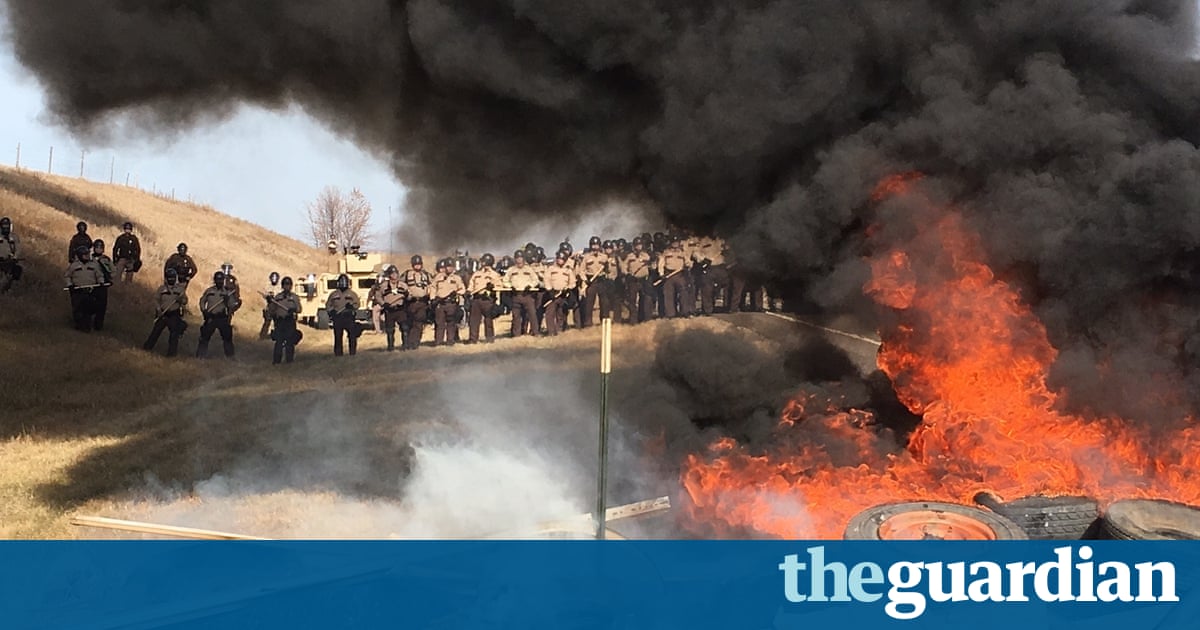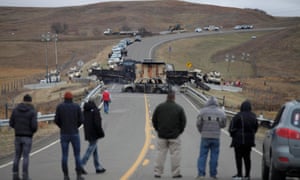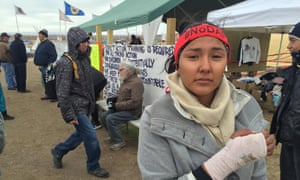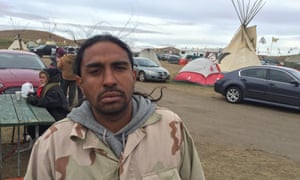Dakota Access pipeline: Native Americans allege cruel treatment

Activists released after arrest treated like were not human beings as standoff with law enforcement continues with peaceful Saturday rally

Native Americans protesting against the Dakota Access pipeline (DAPL) on Saturday accused law enforcement officers of cruel and inhumane treatment in jail, but said mass arrests and violent confrontations with police would not deter them from fighting construction of the oil project.
Activists were reunited at the Sacred Stone camp in North Dakota after their release from local jails. Some told the Guardian police aggressively detained them, crowded them into vans, wrote numbers on their arms to track them, conducted invasive body searches and showed a lack of respect for native culture.
They treat us like were not human beings, said Russell Eagle Bear, a member of the Rosebud Sioux, who was one of 141 people arrested on Thursday when protesters tried to block pipeline construction. Were simply numbers to them.
In tears, Caro Gonzales, a member of the Chemehuevi tribe who was one of the first arrested, said police temporarily detained her and three other women in a large cage that she described as a dog kennel.
We were all crying in pain, saying we needed medical attention, said Gonzales, 26, who also goes by the name Guarding Red Tarantula Woman.

The release from jail of the protesters came after a week of increasingly tense conflict between Native American activists and a growing police force seeking to thwart protests against the $3.8bn pipeline.
The project, which would transport crude oil from the Bakken oil field to a refinery near Chicago, first sparked demonstrations in April, when members of the Standing Rock Lakota and other Native American nations rode on horseback and established the Sacred Stone spiritual camp.
Thousands of activists have since traveled to Cannon Ball, North Dakota, including members of tribes from across the US, launching a massive and ongoing protest that has become a rallying cry for indigenous rights, climate change activism and environmental conservation.
Leaders of the Standing Rock Sioux say the pipeline, a project of the Texas-based corporation Energy Transfer Partners, threatens water supply and cultural heritage and would destroy sacred lands. Over the last week, activists have repeatedly attempted to occupy the property where pipeline construction is beginning, leading to daily standoffs that have ended in arrests and violence.

The Morton county sheriffs office and supporting police agencies from across North Dakota and beyond have now made more than 400 arrests, accusing Native American activists, journalists and filmmakers of rioting, trespassing, arson, resisting arrest and assaulting officers.
The drama intensified when protesters created barricades of fire and set alight vehicles including those meant for pipeline construction.
Protesters and civil rights groups monitoring the demonstration have argued that police have become overly militarized and dangerously aggressive. Law enforcement officials on Friday admitted to using pepper spray, bean-bag and sponge rounds, Tasers and devices that transmit loud bangs and high-pitch tones, in response to what Morton County sheriff Kyle Kirchmeier described as escalated violent and illegal actions.
We got herded around like cattle, said Wakia Chikala, another protester who was arrested on Thursday.
Several members of a youth council that has helped lead the movement at Sacred Stone told the Guardian they were on the front lines of Thursdays standoff and that police attacked them when they tried to remain peaceful.
The cops threw me to the ground, said Wambli Red Bird, 19, of the Cheyenne River Sioux tribe. One of them had a knee on my neck and they were shouting Stop resisting. I was telling them, Im going peacefully.

The cop grabbed me and twisted my hand, added Lauren Howland, a 21-year-old youth council representative and member of the San Carlos Apache tribe who is recovering from a broken wrist sustained in an earlier confrontation with police. But every time we got maced, we got right back up.
Authorities faced widespread criticisms from free speech advocates after police issued an arrest warrant against the broadcast journalist and Democracy Now! host Amy Goodman charges a judge later rejected. The actor Shailene Woodley was also arrested at the protest, which has also attracted visits from the actor Mark Ruffalo and civil rights leader Jesse Jackson.
The ground effort to stop the oil project comes a month after a federal judge denied a request from tribal leadership to block construction permits.
Activists held a peaceful rally on Saturday, marching to a bridge where there is now a roadblock and barricade separating the camp from the pipeline project where police remain stationed with large tanks. Tribal leaders sang as law enforcement helicopters flew above the crowd.
Gonzales said she spent 36 hours behind bars and was now facing multiple charges, including criminal trespassing and conspiracy with fire. Police also impounded her motor home, she said, with all of her belongings.
I dont have any clothes or anything, she said, sitting in a hotel room in a local casino, where she and others were recovering from what they described as traumatic jail experiences.
Gonzales, who lives in Olympia in Washington state and has been at the camp for three months, said she was arrested while praying. They slammed us on to the ground, she said.

She said she was particularly upset by the way police repeatedly searched her and other Native American women.
He searched me everywhere, touched everywhere, she said, adding that the experience has been emotionally draining. I was just crying. I couldnt physically stop myself.
The Morton County sheriffs office did not respond to a request for comment.
Ticky Black Crow Smith, a 29-year-old member of the Kwatsan tribe, said he was arrested twice in the last week, but would not stop protesting.
Im not giving up, he said. DAPL is not giving up. Why should I?
Read more: https://www.theguardian.com/us-news/2016/oct/29/dakota-access-pipeline-native-american-protesters